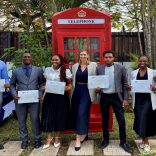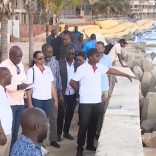Limak Group and UEM announce partnership to support Mozambique’s next generation of women ...
Mozambique: Less than one per cent of Tete city exposed to coronavirus

Photo: MISAU
The preliminary results from an epidemiological survey of the western Mozambican city of Tete indicate that only 0.7 per cent of the city’s residents have been exposed to the coronavirus that causes the Covid-19 respiratory disease.
The National Health Institute (INS) has organised epidemiological surveys in several major cities to estimate the true extent of exposure to the coronavirus. The INS published its Tete results on Thursday.
The surveys use a simple blood test. This does not show whether the person tested is currently infected with the coronavirus, but it does show whether there are coronavirus antibodies in his bloodstream, which is evidence that he has been in contact with the virus.
The survey of Tete households (with a sample size of 1,942 individuals) showed a coronavirus prevalence much lower than that found in several other cities (Nampula, Pemba and Maputo).
In the neighbourhood with the highest coronavirus prevalence, Matundo, 1.7 per cent of the sample showed antibodies in their blood. In three of the ten neighbourhoods, not a single person in the sample was carrying antibodies. The average prevalence across the city was 0.7 per cent.
Divided by age groups the highest prevalence of antibodies, 1.4 per cent, was among people aged between 15 and 34. Only 0.8 per cent of the sample aged between 35 and 59 were carrying the antibodies, and 0.7 per cent of those aged 60 and above.
A second component to the survey looked at specific professional groups to see which was most at risk of coronavirus infection.
2.9 per cent of the 554 policemen surveyed were carrying the antibodies, and 1.5 per cent of the 334 transport operators. Among the latter group, long distance drivers were much more at risk, with a prevalence of 5.9 per cent (but with a small sample of just 17).
0.7 per cent of the health professionals in the survey had been exposed to the coronavirus. The exposure was highest among medical auxiliaries (4.2 per cent) and pharmacists (3.7 per cent). Not a single doctor, nurse or laboratory technician in the survey was carrying the antibodies.
Of the 1,556 market sellers in the survey, 0.8 per cent had been exposed to the coronavirus. Exposure varied widely between markets. In the “Retiro Saudade” market 2.9 per cent of the sellers were carrying the antibodies in their blood, but in some of the smaller markets nobody at all had been exposed.












Leave a Reply
Be the First to Comment!
You must be logged in to post a comment.
You must be logged in to post a comment.